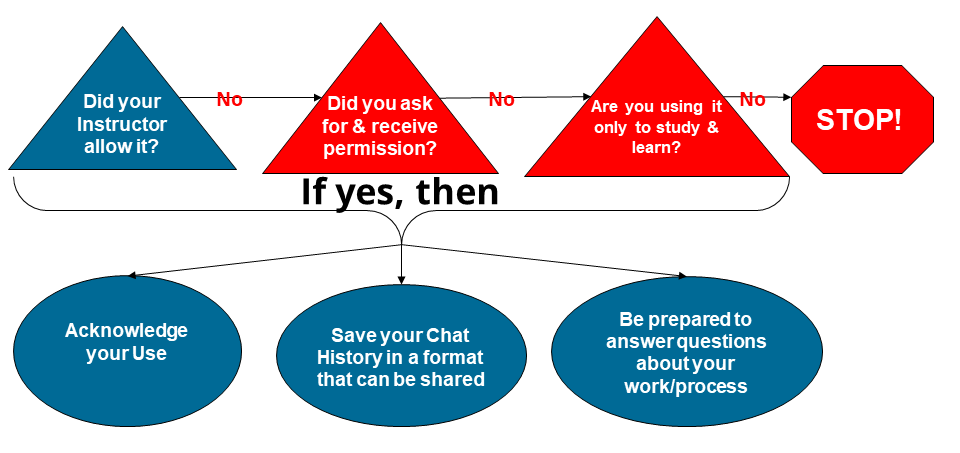Q: Is it cheating to use ChatGPT?
A: Sometimes.
Let's think about it.
What is ChatGPT?
ChatGPT is just one of the many Generative Artificial Intelligence (GenAI) tools to arrive since November 2022. Others include DALL-E, PhotoMath, Co-Pilot, Caktus, Claude, Google Gemini, Github's Co-Pilot, Grammarly, and SnapChat AI. GenAI generates content in response to a prompt provided by a human. GenAI tools were not trained to tell the truth or be factual. They weren't trained to "read", so they have no idea where the output is coming from. In other words, they're only somewhat useful and only sometimes factual.
So, ChatGPT is just like Google, right?
No. It's not. When you Google something, you find a source and then you can choose to read it or not. When you read it, if you decide to use the information in something like an essay, you can cite it. You can't really "cite" ChatGPT, because the professor can't follow up on your citation, unless you submit your chat history to your professor. If you are using a GenAI tool that links to ts sources, you could use it more like Google— to find sources that you will then go to and read for yourself. However, again, if you use the output of ChatGPT in any way without acknowledging or citing it, it's possible that you are violating academic integrity.
But it's still okay to use for academic work, right?
It can be really tempting to see these tools as helpful for doing your academic work. Maybe helping you brainstorm ideas, summarize your readings, do research, or fix your writing. However, once that content is generated, it's really tempting to just copy and paste right into your own doc and then submit it as your own work. It's really important to be aware of how you're using it, if that use is permitted for that class and that assessment, and then being able to articulate where your words/ideas end and the machine's begins.
Here's a decision tree that might be helpful:

To summarize:
If your instructor did not say you could, then you can't.
Silence does not equal permission.
So, if the instructor said I could use it, I'm good to go?
Yes, you're good to use the GenAI tool in the way that instructor authorized for that particular assignment. Don't assume you can use it in ways not authorized or for other assignments or courses. And, if you're authorized to use it, we recommend that you learn how to use it properly first. The Library has a guide that may be helpful! Also, if you use it, save your history so you can share it and acknowledge your use to the professor (even if they didn't ask).
Shouldn't all instructors be allowing us to use GenAI tools? I'm going to need to know how to use them when I graduate!
Some instructors might incorporate GenAI tools into their pedagogy or assessments. That's up to them. Instructors have the responsibility of helping you achieve the learning objectives for each particular assessment and for the course overall. If they've decided that GenAI tools will help you achieve the learning outcomes, then they've likely incorporated them in. If not, they won't. It's not always about learning to use GenAI— different courses have different objectives, and they're all intended to help you develop as a learned, well-rounded, professional and citizen. Also think about this - if you don't have some fundamental human knowledge and skills, will you be able to effectively and responsibly use the tools? For example, you need to learn how to critically read so you can evaluate the output of GenAI tools. You need to understand how to write, so you can critique and revise the writing that GenAI tools might do for you later. You need to understand foundational chemical processes if you're going to work with an AI tool to generate new processes. The list could go on.
But, what happens if I use it anyway?
You can be reported for an integrity violation, which can be an egregious violation leading to suspension and possibly an F in the class. So, why would you risk that?
When you're tempted to use a GenAI tool like ChatGPT or Grammarly, ask yourself this - am I willing to disclose the use to my instructor? If the answer is no, then you shouldn't use it.
When you're tempted to offload your thinking or doing, whether to a GenAI tool or another human, take a moment to pause and reflect on why you are here and what you value. Are you here to learn, so that you can honestly and fairly acquire the knowledge and skills you need to achieve in work and life? While employers may want to hire people who can use AI tools, they aren't going to want to hire anyone who offers no value beyond what the tool can provide.
So, don't replace your humanity with a machine.
*****
If you find you need help to stay focused on learning with integrity, talk to your professors or TAs, the Academic Integrity Office, or make use of all the free services the university provides to you. For more information on those academic services, go to https://ucsd.edu/academics/academic-success.html.
Choose Integrity. Choose to Learn.
To learn more about how to choose integrity & choose to learn, see our Top 10 tips for students.